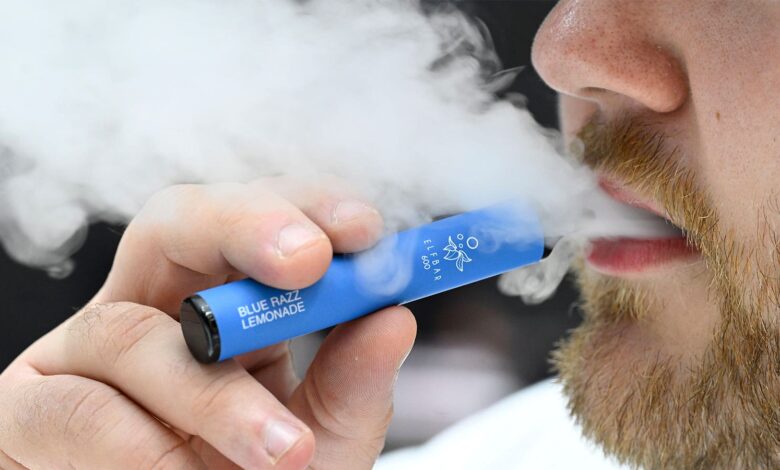Vapers May Be Less Likely to Undergo Lung Cancer Screening

—
“Former smokers who use e-cigarettes remain at increased risk of lung cancer,” researchers say
by
Elizabeth Short,
Staff Writer, MedPage Today
July 2, 2024
E-cigarette use among individuals eligible for lung cancer screening was independently associated with a reduced likelihood of screening, a cross-sectional study of U.S. adults revealed.
Compared with those who never used e-cigarettes, current vapers had a lower odds of ever undergoing lung cancer screening (OR 0.79, 95% CI 0.62-1.00) and of being up to date on screening (OR 0.67, 95% CI 0.51-0.88), reported researchers led by Qian Wang, MD, MPH, of Case Western Reserve University in Cleveland.
The associations were more apparent for former (rather than current) smokers of traditional cigarettes. For individuals who previously smoked, those who used e-cigarettes appeared less likely to have undergone lung cancer screening (OR 0.73, 95% CI 0.52-1.04) and had a 46% lower chance of being up to date on screening (OR 0.54, 95% CI 0.37-0.80) compared with those who never used e-cigarettes.
No associations were seen between past e-cigarette use and lung cancer screening use, according to the findings in JAMA Network Open.
“Former smokers who use e-cigarettes remain at increased risk of lung cancer and should be targeted by interventions to improve adherence to LCS [lung cancer screening],” Wang and co-authors concluded.
E-cigarettes are increasingly being used as cessation aids for smokers seeking to quit traditional cigarettes, the research team explained in their introduction, but there have been growing concerns about the potential for lung cancer risk with long-term use, among other concerns.
“Emerging research suggests that e-cigarettes contain definite and probable carcinogens and cause similar cancer-associated gene deregulations as combustible tobacco,” wrote Wang and co-authors. “However, it has been shown that two-thirds of individuals currently using e-cigarettes consider e-cigarettes to be less harmful than combustible cigarettes. Thus, individuals who use e-cigarettes may have lower awareness of lung cancer risks.”
Their study included more than 20,000 individuals who met the current criteria for lung cancer screening set by the U.S. Preventive Services Task Force (USPSTF). The task force first recommended screening via low-dose CT in 2013, but broadened its criteria for eligibility in 2021.
“I would not see this as ‘Well, you shouldn’t be smoking an e-cigarette,'” said Nancy Rigotti, MD, of Massachusetts General Hospital in Boston, of the findings from Wang’s group. “If you’re smoking an e-cigarette and you used to smoke, you still need lung cancer screening.”
“It’s a reminder for us that we need to make sure that everybody who has recently or are currently smoking cigarettes and fits the eligibility criteria for lung cancer screening gets lung cancer screening,” said Rigotti, who was not involved in the study.
Current USPSTF guidelines recommend annual screening via low-dose CT for adults ages 50 to 80 years who have at least a 20 pack-year smoking history and who either currently smoke or have quit in the past 15 years.
But in clinical practice, uptake of the screening recommendations has been “woefully low,” noted Ashley Prosper, MD, of the University of California Los Angeles, who also was not involved in the study.
In the current sample, just 27% of the individuals had undergone lung cancer screening.
“Barriers to lung cancer screening adherence are myriad,” Prosper told MedPage Today via email. These include “factors such as participant characteristics (insurance status, income, race, education), healthcare provider factors (whether or not a recommendation for lung screening is made by a provider to an eligible patient), and a number of psychological variables that are unique to lung screening as compared to other cancer screenings — such as the fear of discovering a lung cancer and stigma associated with smoking.”
Wang and colleagues’ study included 22,713 individuals from within the 2022 Behavioral Risk Factor Surveillance System who met current USPSTF guidelines for lung cancer screening.
Median age was 62 years and 56% were men. Most were white (77%), while 9% were Black, 7% were Hispanic, and 7% were of another race. Individuals had a median 39 pack-year history of cigarette smoking: a majority still smoked (59%) while the rest were former smokers (41%; median 6 years since quitting).
With regard to e-cigarette use, a majority (55%) had never used them, while 35% were former users and 9% were current users. The vast majority (81%) of the sample had had a routine checkup in the prior year, and nearly two-thirds said they were in good general health.
Overall, 5,885 individuals had undergone screening, with 3,472 (14.6%) up to date on screening and 2,513 (11.4%) no longer up to date.
People who underwent screening tended to be older (64 vs 61 years for those never screened); have lower income, poorer health, more comorbidities, and a greater smoking history (43 vs 38 pack-years); and they were more likely to have attempted quitting in the prior year (18% vs 14%) and live in the Northeast. Individuals in the screening group were also more likely to have reported never using e-cigarettes (57% vs 55%) and were less likely to be uninsured (2% vs 7%).
Study limitations cited by Wang and colleagues included the cross-sectional design, use of self-reported screening and smoking information, and the fact that the study could not account for switching between traditional cigarettes and e-cigarettes and the impact of that on screening uptake.
-
![author['full_name']](https://clf1.medpagetoday.com/media/images/author/EShort_188.jpg)
Elizabeth Short is a staff writer for MedPage Today. She often covers pulmonology and allergy & immunology. Follow
Disclosures
Wang reported no disclosures. Co-authors reported relationships with Regeneron, Mirati, AstraZeneca, Amgen, Sanofi, Pharmaceutical Product Development, and Axella.
Prosper is a member of the American College of Radiology’s Lung CT Screening Reporting & Data System (Lung-RADS), is co-director of UCLA’s Lung Screening Program, and reported a relationship with the National Institutes of Health.
Rigotti reported a relationship with Achieve Life Sciences.
Primary Source
JAMA Network Open
Source Reference: Wang Q, et al “E-cigarette use and lung cancer screening uptake” JAMA Netw Open 2024; DOI: 10.1001/jamanetworkopen.2024.19648.



